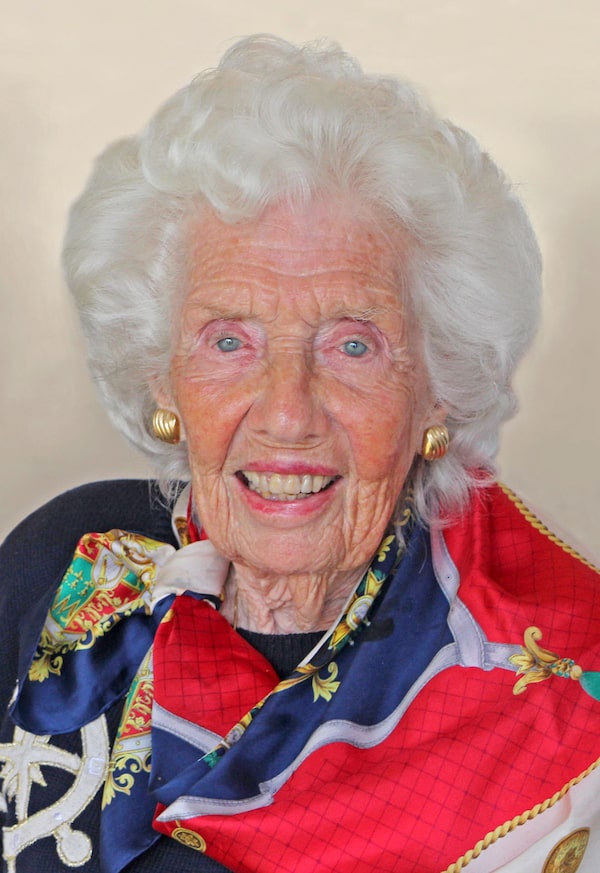
Mrs. Irving gave much of her wealth and time to the people of New Brunswick.Handout
Many years ago after a Sunday morning church service, Jean Irving went out for lunch at a restaurant in Saint John. There was a long wait for a table, and so Mrs. Irving stood in line with everyone else.
But in Saint John, the matriarch of the influential Irving family – a multibillion dollar business empire that employs thousands in the province, and whose personal philanthropy has helped so many – was no ordinary customer. Someone recognized her and tried to usher her to the front of the line.
“She was almost horrified. She wouldn’t let them take her in. The last thing she wanted was to be in the spotlight,” said Rev. Mel Norton, Mrs. Irving’s long-time pastor. “She never forgot her roots.”
Jean Elizabeth Saunders was born in Detroit on April 20, 1926, to Edith Keiller Saunders of Croyden, England, and Adolphus Saunders of Brockton, Mass. Her father, a veteran of the First World War, left his job at the Ford assembly plant in Detroit and brought his young family to New Brunswick when his daughter was still a baby. She grew up on the family dairy farm in Glenvale, N.B., during the Great Depression. She was baptized in the nearby Petitcodiac River and attended a one-room schoolhouse before becoming a registered nurse.
Mrs. Irving died at her at home in Rothesay, N.B., on Oct. 29, surrounded by her family. She was 93.
Known affectionately in the province as “Mother Irving,” she gave much of her wealth and time to the people of New Brunswick, supporting a wide range of causes from a pregnancy centre for young mothers and art galleries to autism initiatives and swimming lessons for children.
Her husband of 69 years, James K. Irving – eldest son of industrialist K.C. Irving and one of the richest men in Canada – called her his “compass.” She was a nursing student when they met, and was his “guiding light” as he grew a business network that extended into forestry, pulp and paper, tissue, lumber, building supplies, frozen food, transportation, shipping lines and ship building.
But friends say Mrs. Irving did not let the weight of her surname change her grounded nature. She remained a self-described farmer’s daughter who came from limited means and wanted to give back to her community.
She could be blunt when needed and was not afraid to get her hands dirty, whether planting daffodils at the Christian university she sponsored in Sussex, organizing a strawberry shortcake fundraiser or flipping burgers as part of a program she co-founded for children at an inner-city school in Saint John.
“She walked among all people. She was very down to earth, she would talk to and help anybody,” said former Saint John mayor Shirley McAlary, now the deputy mayor. “She understood firsthand the difficulties many people go through.”
Ms. McAlary came to know Mrs. Irving when a group of women were creating First Steps, a housing and education centre founded in response to a teen pregnancy crisis in Saint John. Mrs. Irving didn’t just donate to the new centre, she also took a hands-on role in the building’s renovation and design.
“I went to her and asked if she’d be willing to help, and she just came on board like a powerhouse,” she said. “She took over the kitchen renovation, and insisted on having red counter tops and a red table. She felt that was a happy colour.”
Her support for the pregnancy centre continued until her death. At Christmastime, gifts would arrive for the young mothers, personally signed by Mrs. Irving. She would send her driver by regularly to deliver baby formula and diapers.
Along with her husband, Mrs. Irving’s philanthropy also created parks and public spaces across the province, building school playgrounds, chapels and gardens. She was instrumental in the Millennium Dome Park in Saint John, which salvaged the landmark dome from the now-demolished Saint John General Hospital, and restored it near a former boarding house for nurses, which is where she met her future husband.
Programs that helped children were especially important to her. She supported the Children’s Wish Foundation, and sponsored the crews of HMCS Fredericton in their annual “Bike for Wishes” fundraiser. As part of her long-standing connection to the ship, she’d invite the entire crew for a lobster dinner at the farm where she grew up near Petitcodiac.
As the grandfather of a Baptist preacher, Mrs. Irving’s faith was a big part of her life. She was a Sunday school teacher for many years at the Saint John First Wesleyan Church, and volunteered on the board of the Beulah Camp and Conference Center, a Christian campground in Brown’s Flat. A youth dormitory on nearby Caton’s Island for campers and counsellors is one of the many gifts she left the facility.
Mrs. Irving constructed a chapel on her own property, and created the Netherwood Chapel Kids Club Foundation, a charity that fed and taught Bible stories to as many as 60 local children once a week. On the day she died, the club still held its weekly gathering in the chapel, as per her wishes.
“The children’s club was a priority for her and she wanted them to hold their little meeting that day,” Father Norton said. “We need more people who are authentic in our society today. They don’t come any more authentic than her.”
While she was honoured with the Order of New Brunswick, the Governor-General’s Caring Canadian Award, the Queen Elizabeth II Silver and Gold Jubilee Medals and the Salvation Army’s Order of Distinguished Auxiliary Service, much of Mrs. Irving’s philanthropy happened out of sight and out of the newspapers. She preferred it that way.
“She just did this in a spirit of ‘I’m glad to help.’ She was often behind the scenes, but very deeply involved,” Father Norton said. “She didn’t want the recognition because of the Irving name. She wanted to just be who she was. She really had a heart of compassion.”
Mrs. Irving leaves her husband, J.K. Irving; four children, Jim, Robert, Mary-Jean and Judith; 14 grandchildren; seven great-grandchildren; and extended family.
To her admirers, she was an approachable, genuine connection to a family that is often revered, and much discussed, in the province. She was the family’s moral conscience, and encouraged her children to give back the way that she had, softening their public image.
“I know the Irving name is really big and powerful in New Brunswick,” Ms. McAlary said. “But she helped show they’re just human beings like the rest of us.”
 Greg Mercer
Greg Mercer